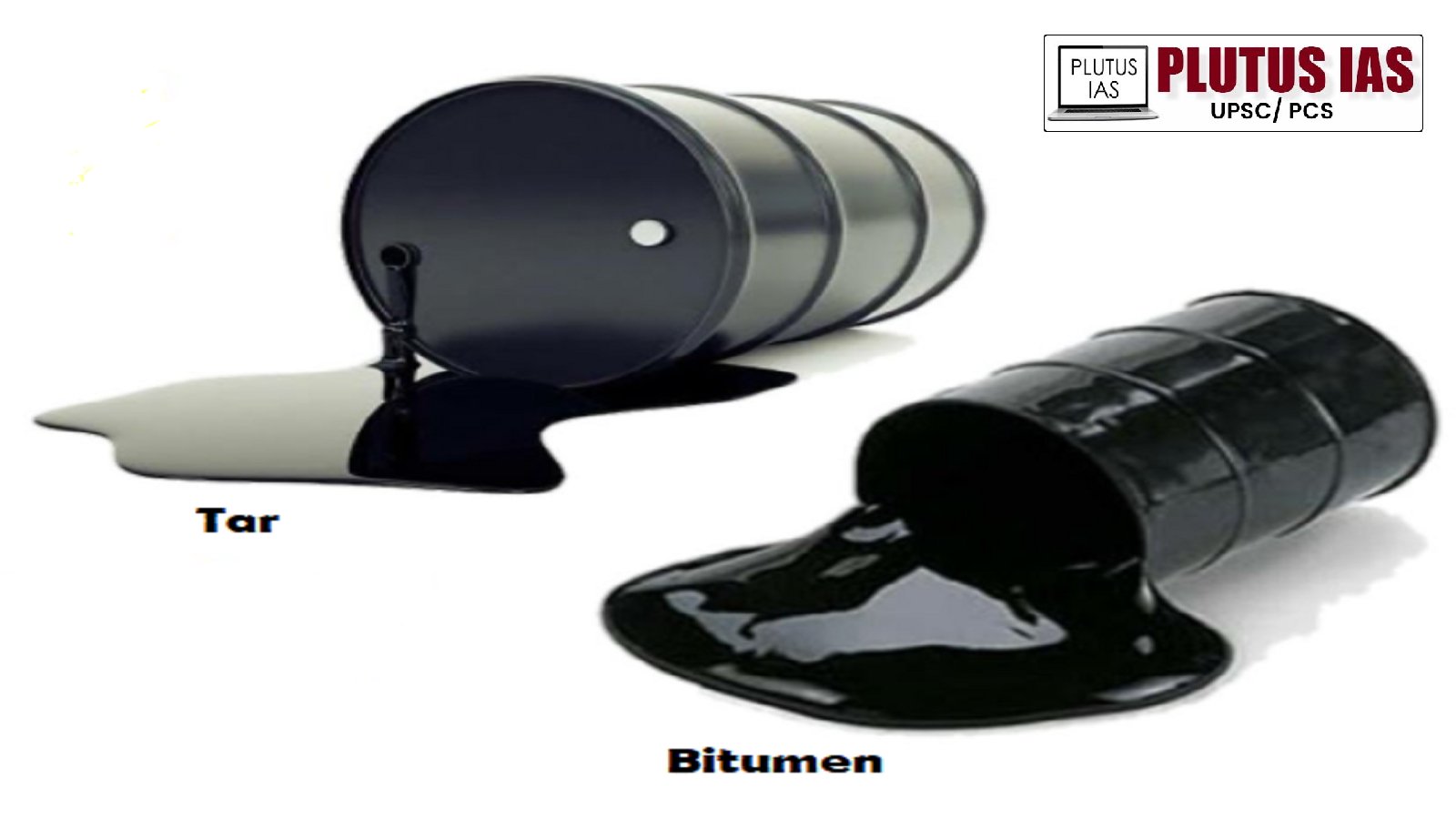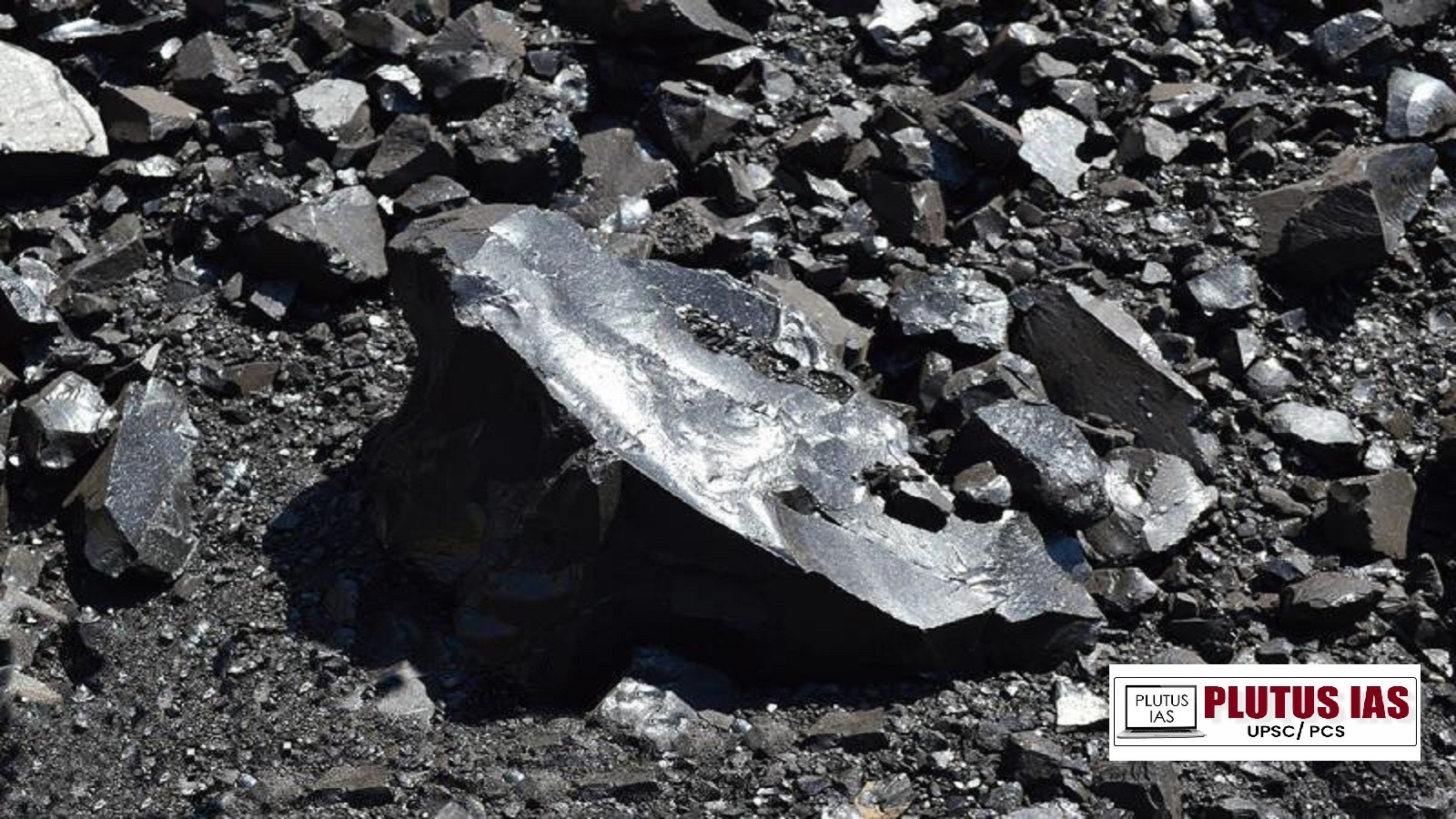01 Jul Production of Bio-Bitumen or Bio-tar starts in India
( This article is related to the section ‘ Biodiversity, Environment and Ecology, Environmental Pollution and Environmental Protection, Achievements of Indians in Science and Technology ’ under General Studies Paper-3 of UPSC Civil Services Mains Exam and ‘ Development of National Highways , Climate Change , Environmental Pollution , Renewable Energy, Bio-bitumen or Bio-tar ’ under UPSC Preliminary Exam. It also includes suggestions from the PLUTUS IAS Team. This article is related to ‘ Production of Bio – Bitumen or Bio-tar starts in India’ under ‘ Daily Current Affairs’.)
Why in the News ?
- Recently India has initiated plans to start production of bio-bitumen or bio-bitumen on a large scale from biomass or agricultural waste.
Bio – Bitumen :

- Bio-bitumen is a bio-based binder derived from renewable sources such as vegetable oils, crop stubble, algae, lignin (a component of wood) or animal manure.
- Bio-bitumen production has been developed as a local alternative to petroleum bitumen, thereby reducing environmental impact.
- It is used in the construction of roads and roofs. It is used as a direct replacement, modifier, and rejuvenator.
- Straw will be used in making roads with bio-bitumen technology, which can reduce pollution.
Origin and Production :
- Similar to petroleum bitumen, bio-bitumen is also obtained from the distillation of crude oil. For its production, vegetable oils and other organic sources are used, which have high natural suitability and availability. It can be produced naturally using biomass plants, biogasification and other technologies.
Properties and Uses :
- The main uses of bio-bitumen are in airtight structures, such as as a waterproof binder for road construction (asphalt floors), buildings, and marine structures. Due to its high adhesive and waterproof quality, it has been developed as a replacement medium for impermeable and traditional binders in structures.
Ways to use Bio – Bitumen :
- Direct Substitution : Completely replacing petroleum bitumen with bio-binder.
- Researchers : Addition of organic matter to conventional bitumen to improve its properties.
- Rejuvenation: Restoring the quality and functionality of old asphalt pavements.
- Uses of bio-bitumen as an alternative to petroleum bitumen : Bio-bitumen in India can be used as a viable alternative to petroleum bitumen in construction of structures that are natural and environmentally safe. Construction of national highways is expected to be around 12,300 km in the financial year 2023-24, Which is equal to approximately 34 kilometers per day.
- Bitumen consumption in India : Bitumen consumption in India Its Reflects the diversity of production, import and use, and also measures the increase in consumption with the development of national highways.
Main objectives of Bio – Bitumen production initiative in India :
Bio-bitumen or bio-bitumen is being produced in India for the following purposes-
- Reducing import dependence : Its primary objective is to replace imported bitumen with domestically produced bio-bitumen in the coming decade, thereby reducing foreign exchange expenditure.
- Addressing environmental concerns : Bio-bitumen production aims to reduce environmental issues associated with stubble burning by using biomass and agricultural waste as feedstock.
- Promoting sustainable practices : By using bio-based materials, this initiative supports sustainable road construction practices and is in line with global environmental standards.
- Technical development and experimental studies : The Central Road Research Institute (CRRI) is collaborating with the Indian Petroleum Institute to conduct a pilot study on a 1 km road using bio-bitumen.
Major challenges of bio-bitumen production in India :

There are some significant challenges associated with the production and use of Bio – Bitumen in India. Which are as follows –
- Cost Effectiveness :
- Currently bio-bitumen production can be more expensive than conventional methods.
- Long term Performance :
- More extensive field trials are needed to assess the long-term performance and sustainability of bio-asphalt.
- Standardization :
- For bio-bitumen to be widely adopted, it is necessary to establish clear standards and specifications for it.
- Other innovation methods :
- steel slag road technology :
- Steel slag is a new method of using waste generated during steel production to create stronger and more durable roads.
- Companies in Hamburg, Germany developed 100% recycled asphalt pavement (RAP) to reduce costs, save energy, and reduce carbon emissions.
- Plastic Roads :
- India has constructed a total of more than 2,500 kilometers of wide plastic roads.
- Even at the global level, plastic roads are being constructed in more than 15 countries.
- For example, in Ladakh it is mandatory to use at least 10% plastic waste for road construction.
- steel slag road technology :
Source – The Hindu and Economic Times.
Practice Questions for Preliminary Exam :
Q.1. Which of the following is used for construction of roads in India to reduce carbon footprint from an environmental point of view? (UPSC-2020)
- Geotextiles.
- Cold mix asphalt technology.
- Copper Slag.
- Cold mix asphalt technology.
- Hot mix asphalt technology.
- Portland cement .
Select the correct answer using the code given below.
A. Only 2, 3 and 4
B. Only 3, 4 and 5
C. Only 1, 2 and 5
D. Only 1, 2 and 3
Answer – D
Practice Questions for Main Exam :
Q.1. Outline the main objectives of production of bio-bitumen or bio-coal tar in India and discuss in detail its major challenges. ( UPSC CSE – 2021 Word Limit – 250 Marks – 15 )
Qualified Preliminary and Main Examination ( Written ) and Shortlisted for Personality Test (INTERVIEW) three times Of UPSC CIVIL SERVICES EXAMINATION in the year of 2017, 2018 and 2020. Shortlisted for Personality Test (INTERVIEW) of 64th and 67th BPSC CIVIL SERVICES.
M. A M. Phil and Ph. D From (SLL & CS) JAWAHARLAL NEHRU UNIVERSITY, NEW DELHI.



No Comments